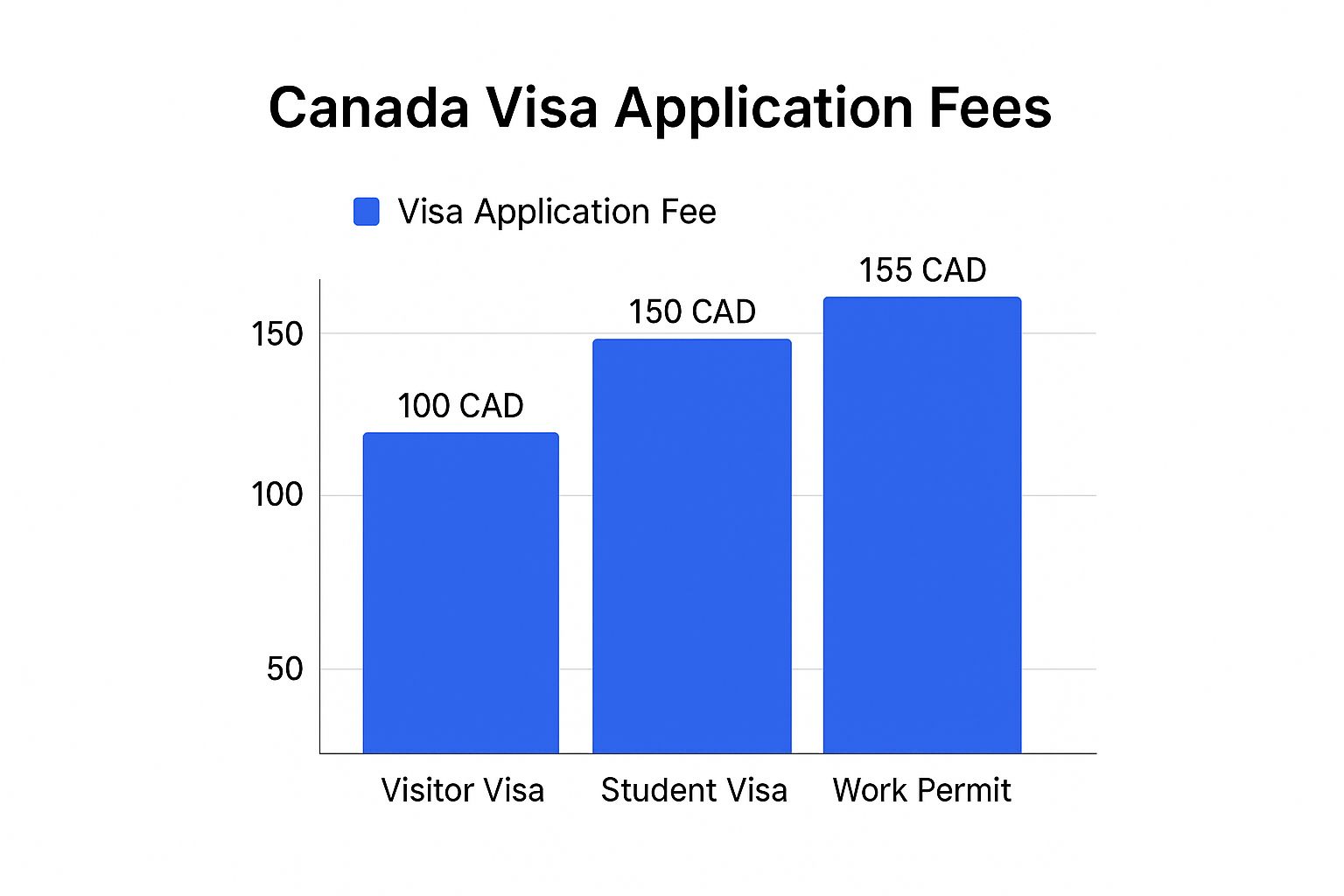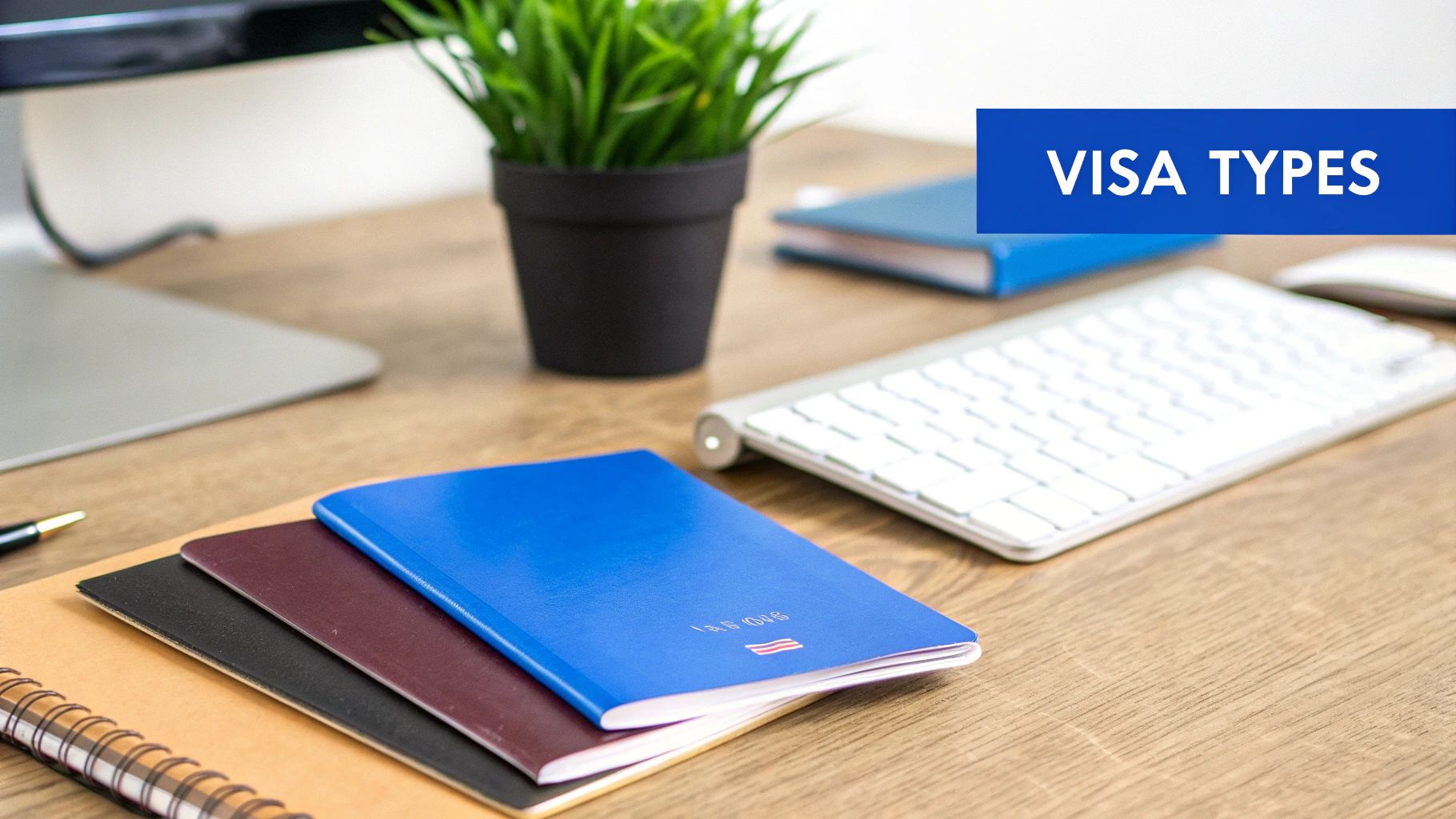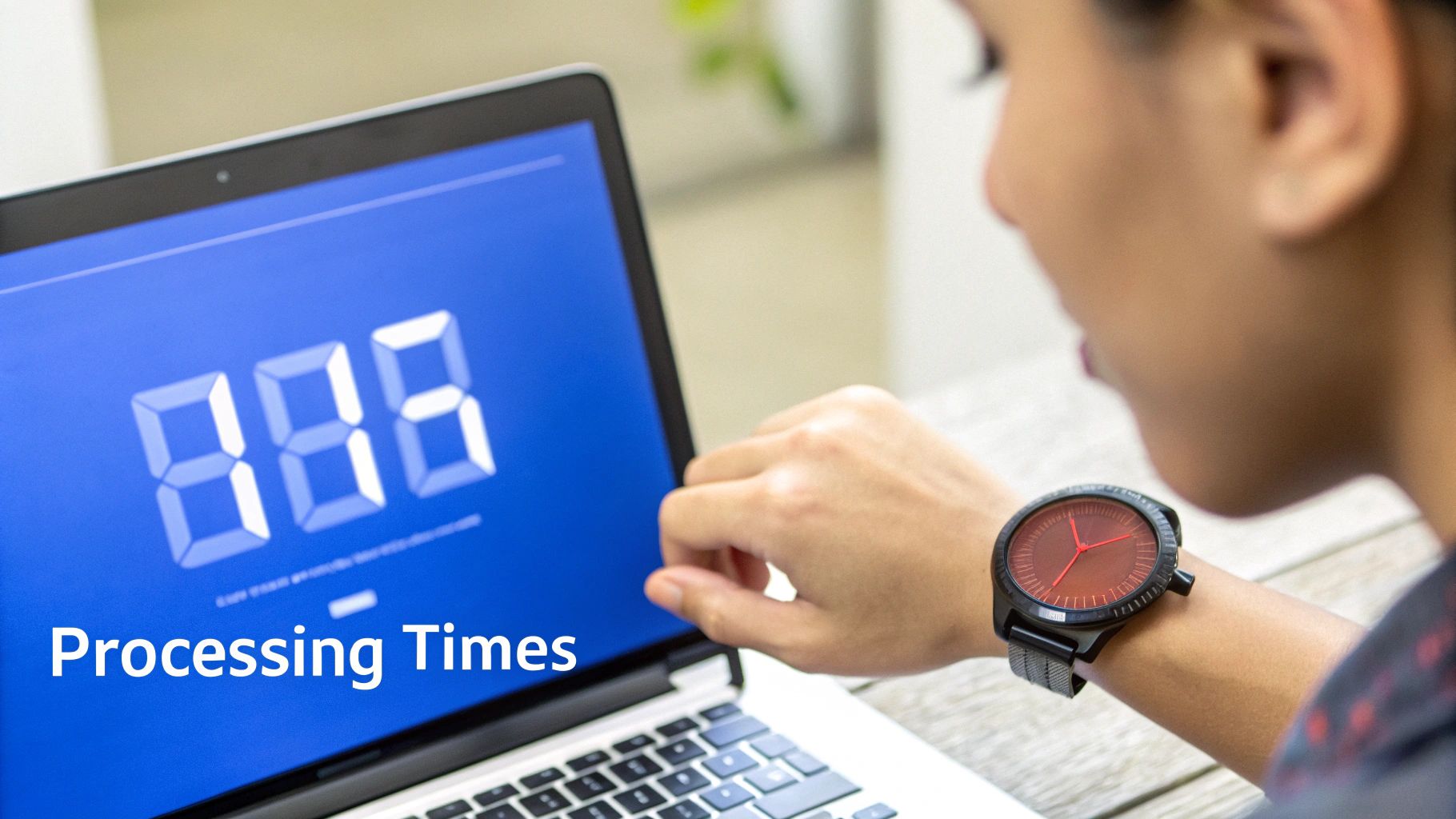How Much Is Canada Visa from Nigeria? Complete Cost Guide

When you start planning your journey to Canada, one of the first questions on your mind is probably, "So, how much is this visa going to cost me?"
The quick answer is that a standard visitor visa application fee is CAD 100, and a study permit costs CAD 150. But honestly, that’s just the tip of the iceberg. Those figures are only the starting point for your budget.
A Financial Snapshot of Your Canada Visa Application
Think of your visa application budget like planning for a big event. You have the main ticket price—the government application fee—but there are several other necessary costs you simply can't overlook. Getting a clear financial picture from day one helps you avoid nasty surprises and keeps your application process on track.
It's also important to remember that for Nigerian applicants, all the official fees are charged in Canadian Dollars (CAD). This means the final amount you'll pay in Naira (NGN) will change depending on the exchange rate on the day you pay.
Breaking Down the Base Costs
First up, you have the main application processing fee. This is the core cost, and it changes based on why you're going to Canada. A visitor visa for a holiday has one price, while a study permit for school or a work permit for a job each have their own specific fees.
On top of that, most applicants from Nigeria will also have to pay a biometrics fee. This covers the cost of getting your fingerprints and a photograph taken at a Visa Application Centre (VAC). Just think of it as a security measure—a unique digital signature that connects you directly and securely to your application.
This handy chart gives you a quick visual comparison of the main government fees for the most common visa types.

As you can see, the base fees for work and study permits are a bit higher than what you'd pay for a standard visitor visa.
Let’s put all this into a simple table so you can see the numbers at a glance.
Canada Visa Application Fees for Nigerians (in CAD)
This table provides a quick overview of the standard government fees for the most common visa types. Remember, these are just the base costs before you factor in other potential expenses.
| Visa Category | Application Fee (CAD) | Biometrics Fee (per person, CAD) | Estimated Total (CAD) |
|---|---|---|---|
| Visitor Visa (single applicant) | 100 | 85 | 185 |
| Study Permit (single applicant) | 150 | 85 | 235 |
| Work Permit (single applicant) | 155 | 85 | 240 |
This table shows how the numbers add up. The total government-mandated cost is a combination of the application fee for your specific visa and the standard biometrics fee.
Understanding the Full Picture
So, to break it down for Nigerian applicants: a visitor visa application costs CAD 100, a study permit is CAD 150, and a work permit is CAD 155.
Once you add the mandatory biometrics fee of CAD 85 per person, your initial cost for a single application will land somewhere between CAD 185 and CAD 240. You can discover more insights about these visa fees and how they apply specifically to your situation. This initial total covers the core government expenses, but you'll still need to budget for other things like medical exams or police clearance certificates down the line.
Breaking Down the Costs: Temporary Visas for Visitors and Students

For most Nigerians, the dream of going to Canada starts with a temporary visa. This could be for a much-needed holiday, pursuing a degree, or a temporary work contract. But these applications aren't all priced the same—and for good reason. Before you even ask "how much is a Canada visa?", it's helpful to understand what your money is actually paying for.
Think of it this way: a visitor visa is like buying a ticket to a weekend festival. It’s for a specific, short-term purpose. A study permit, however, is more like paying tuition for a full academic year. It gives you access to an institution for a longer period and comes with different rules and, naturally, a higher cost.
Visitor vs. Study Permit Fees
When you pay the visitor visa fee, you're essentially paying for the Canadian government to review your application for a short stay. It's perfect for tourism, visiting family, or attending a quick business conference.
The study permit fee is different. It covers the more detailed assessment required to approve you as an international student. This permit allows you to live in Canada for the entire length of your programme and often lets you work part-time. The higher fee is a direct reflection of the more complex processing and the longer-term privileges you're granted.
The bottom line: The price you pay is tied directly to how long you plan to stay and what you plan to do in Canada. The government's processing effort and the rights that come with the permit are what determine the final cost.
What if You Need to Stay Longer or Your Status Expires?
Life happens. Sometimes plans change and you need more time in Canada. In a worse scenario, you might accidentally let your status expire. Canada has specific processes and fees for these situations, and it's smart to know what they are upfront.
- Extending your stay: Already in Canada as a visitor but want to stay longer? You'll need to apply for what's called a 'visitor record', which has its own processing fee.
- Restoring your status: If you overstay your visa, don't panic. You have a 90-day window to apply to restore your status. Be warned, though—this is much more expensive than a simple extension and approval isn't guaranteed.
It’s crucial to factor these potential costs into your overall budget.
Keep in mind that the Canadian government adjusts these fees from time to time. For example, new fee increases for temporary residents are set to take effect on 1 December 2024, which will impact many applicants from Nigeria.
To give you an idea, before this change, the fee to restore your status as a visitor was CAD 229. For students and workers, it was CAD 379 and CAD 384, respectively. This just goes to show how vital it is to check for the most current fees before you submit anything. You can read more about the upcoming fee adjustments to stay ahead of the changes.
The Investment in Permanent Residence
For many Nigerians, moving from a temporary visa to permanent residence (PR) is the ultimate goal. This is where the question "how much is a Canada visa?" changes entirely. We're no longer talking about a short-term fee, but a real investment in your future.
Think of it this way: a visitor or study visa is like renting an apartment. It serves a purpose for a set period. Applying for permanent residence, however, is like putting a down payment on a house. The upfront cost is higher, but it’s the key to unlocking long-term stability, security, and a host of benefits in Canada.
Core Permanent Residence Fees
When you start your PR journey, especially through popular routes for skilled workers like Express Entry, you’ll run into two main government fees. It's crucial to understand that these are completely separate from any temporary visa costs you might have paid before.
-
Application Processing Fee: This is the non-refundable fee you pay for Immigration, Refugees and Citizenship Canada (IRCC) to actually review your entire application. It covers all the administrative work of going through your documents, checking your eligibility, and assessing your profile.
-
Right of Permanent Residence Fee (RPRF): This is a different fee you pay only after your application has been approved. Consider it the final step that officially seals your new status. The great thing is, if your application isn't successful for some reason, this fee is refunded.
Getting a clear picture of these two costs is your first step to creating a realistic budget for your PR dream. For a complete walkthrough of the process itself, our guide on the Canada permanent residence application is a great resource.
Key Insight: The RPRF is only paid upon success. This separates the cost of applying from the cost of actually becoming a permanent resident, making the initial financial risk slightly lower.
What Does Permanent Residence Cost?
The total fees for economic immigration streams like Express Entry definitely show the higher financial commitment needed for PR status. For a single person applying, the total government fee is CAD 1,525.
This amount breaks down into a CAD 950 processing fee and a CAD 575 Right of Permanent Residence Fee. This figure reflects the incredible value that comes with PR, including access to Canada’s universal healthcare and social systems. You can always verify the latest costs on the official fee structure on the Canadian government's website.
Of course, most Nigerian professionals don’t make this move alone. If you're bringing your spouse or children, you'll need to factor in their fees as well. Planning for these combined costs from the very beginning is vital for ensuring your family’s journey to becoming permanent residents is as smooth and stress-free as possible.
Understanding the Biometrics Fee

On top of the main application fees, there's another cost that catches many Nigerian applicants by surprise: the biometrics fee. It's a non-negotiable step for most, but once you understand what it’s for, it becomes just another box to tick on your journey to Canada.
Think of your biometrics—your electronic fingerprints and a digital photo—as your personal security signature. This unique identifier links you directly and securely to your application. It’s a crucial tool Canada uses to protect its immigration system, and it’s why most visa applicants need to do it.
Who Needs to Give Biometrics and What's the Cost?
If you're a Nigerian applying for a visitor visa, study permit, work permit, or even permanent residence, you'll almost certainly need to provide your biometrics. The fee is standard, but the total amount depends on whether you're applying solo or with your family.
Here’s the breakdown:
- For an individual applicant: You’ll pay CAD 85.
- For a family applying together: The total fee is capped at CAD 170.
This family cap is a real money-saver and a key detail to factor into your budget. For instance, a family of four wouldn't pay CAD 340 (4 x 85). Instead, you pay the flat CAD 170 for everyone. It’s a small detail that makes a big difference in your total costs.
Where to Get It Done and How Long It Lasts
You can't just walk into any photo studio for this. You must book an appointment and give your biometrics at an official Visa Application Centre (VAC) in Nigeria. These are the only centres authorised by the Canadian government to collect this sensitive information.
Here’s the best part: once you've given your biometrics, they remain valid for 10 years. This is a huge plus. If you provide them for a visitor visa application today, you won't need to repeat the process or pay the fee again if you decide to apply for a study permit two or three years down the line. It's a one-and-done task for the next decade.
The Hidden Costs: What Else You'll Pay For Beyond the Application Fee
Let's be clear: the official government fees you see on the IRCC website are just the starting point. They're not the final bill. When you ask, "how much is a Canada visa?", it's easy to focus only on that main number and get caught off guard by other expenses down the road.
Think of it like buying a car. The sticker price is what gets your attention, but you still have to budget for insurance, registration, and fuel to actually drive it. Your Canada application works the same way. The government fee gets your application in the door, but you need to pay for several other essential services to get it across the finish line.
These "hidden costs" are paid to different organisations, not the Canadian government, but they are just as crucial. Ignoring them can bring your entire application to a halt.
Common Third-Party Expenses for Nigerian Applicants
So, what are these extra costs? Here’s a rundown of the most common ones you should expect and plan for from the very beginning.
-
Medical Examination: For most Nigerians, a medical exam is mandatory. You must visit an IRCC-approved panel physician in Nigeria to get this done. The exam is to make sure you meet Canada's health standards, and it's a non-negotiable cost.
-
Police Clearance Certificates: Canada needs to know you don't have a serious criminal record. You'll have to get a police certificate from Nigeria, plus from any other country where you’ve lived for six months or more since turning 18. Each country charges its own fee for this.
-
Language Tests (IELTS or CELPIP): If you're applying for permanent residency (like Express Entry) or certain study and work permits, proving your English skills is a must. This means booking and paying for a standardised test like IELTS, which comes with a significant fee.
-
Educational Credential Assessment (ECA): For skilled worker programs, you need to prove your Nigerian degrees or diplomas are equivalent to Canadian ones. You'll pay a designated organisation, like WES, to assess your credentials and produce an official report.
It's also important to remember that these costs are completely separate from the settlement funds you need to have in your bank account. To get a handle on that specific requirement, our guide on the proof of funds for Canada breaks it all down for you.
To help you budget accurately, let's put all these potential expenses into a clear checklist.
Checklist of Additional Application Expenses
Here's a quick look at the third-party services you might need to pay for. Having a solid financial plan that includes these items will save you a lot of stress.
| Expense Item | Why You Might Need It | Estimated Cost Range (NGN/CAD) | Commonly Required For |
|---|---|---|---|
| Medical Exam | To prove you meet Canada's health admissibility requirements. | NGN 150,000 – 250,000 / CAD $250 – $400+ | All PR; most temporary visas over 6 months. |
| Police Certificates | To show you have no disqualifying criminal record. | Varies by country. NGN 20,000 – 60,000 per cert. | All PR; some temporary visa applications. |
| Language Test (IELTS/CELPIP) | To demonstrate English or French language proficiency. | NGN 150,000 – 250,000 / CAD $300 – $400+ | Express Entry, most economic PR paths, some study/work permits. |
| Educational Credential Assessment (ECA) | To verify your foreign education is equal to Canadian standards. | NGN 150,000 – 250,000+ / CAD $240 – $400+ | Express Entry (FSW), some PNP streams. |
| Biometrics | Fingerprints and photo taken at a Visa Application Centre (VAC). | CAD $85 (individual) or CAD $170 (family) | Most temporary and permanent resident applications. |
Budgeting for these items alongside your main application fee and proof of funds is the smartest way to ensure a smooth and financially sound application journey. Don't let these extras become last-minute surprises
How to Pay Your Canada Visa Fees in Nigeria

Alright, so you've tallied up all the costs for your Canada visa application. The next big hurdle? Actually getting the payment from Nigeria to Canada. It can feel like a complicated final step, but trust me, it’s quite manageable once you know the ropes.
The most popular and direct route is paying online via the secure IRCC portal right when you submit your application. It’s designed to be fast and efficient. The catch, however, is that paying in Canadian Dollars (CAD) from Nigeria can sometimes throw a spanner in the works.
Why? Many Nigerian bank cards come with strict daily or monthly limits on international transactions. If your total visa fee is more than your bank's limit, the payment will simply fail. A quick call to your bank beforehand to check your card's international spending limit can save you a world of stress.
Overcoming Payment Hurdles
If your card gets declined, don't panic. It happens more often than you think. Here are a few practical workarounds to get your payment across the finish line:
- Try a different card: Often, the problem isn't your fault but a glitch with a specific bank's system. Simply trying a debit or credit card from another Nigerian bank can do the trick.
- Use a domiciliary account: Got a domiciliary account? The card linked to it (usually in USD, EUR, or GBP) often has higher limits and fewer restrictions for international payments. This is a solid option.
- Pay in person: If online methods are proving stubborn, you can always pay your fees directly at a Visa Application Centre (VAC) here in Nigeria. It's a reliable backup plan.
Crucial Tip: Always remember that the final amount you are charged in Nigerian Naira (NGN) will be based on the exchange rate at the very moment you pay. Rates fluctuate daily, so it’s smart to have a little extra in your account to cover any unexpected shifts.
Managing Your Payment Strategy
Picking the right payment method isn't just about convenience; it’s about preventing delays. A failed payment can halt your entire application, whether you're going for a temporary work permit or permanent residency. For those on the employment path, our guide on how to apply for a work visa has more specific details.
By preparing for common issues like bank limits and unpredictable exchange rates, you can tackle this final financial step with confidence. It ensures your Canadian dream stays firmly on track without any last-minute hitches.
Got More Questions? Here Are Some Common Ones About Canada Visa Costs
It’s completely normal to have a few more questions rattling around your head after looking at all these numbers. The financial side of a Canadian visa application can be a bit tricky, so let’s clear up some of the most common queries we see from Nigerians.
Is My Money Gone if My Visa Is Refused?
This is the big one, isn't it? The straightforward answer is that the main application processing fees are not refundable. Think of it this way: you’re paying for the time and expertise of an immigration officer to thoroughly review your case. That work is done whether the final answer is yes or no.
But there’s one important exception. The Right of Permanent Residence Fee (RPRF) is a different story. You only pay this fee after your application has been approved in principle, so if things don't work out in the end, you’ll get this specific fee back.
Do I Have to Pay the Same Fees for My Kids?
For the most part, yes. When it comes to temporary residence applications like visitor visas or study permits, a child pays the same processing fee as an adult. There's no discount there.
Where you'll see a significant saving is with the biometrics fee. An individual pays CAD 85, but an entire family applying at the same time will only pay a maximum of CAD 170. That’s a huge relief for families with several children, as it stops the costs from multiplying.
Do These Fees Change Often?
They do. The Canadian government doesn't keep the fees set in stone forever; they review and adjust them periodically to keep up with the real costs of processing applications. For instance, we saw fee increases announced for December 2024.
Expert Tip: Don't rely on old blog posts or what a friend paid last year. Just before you submit your application, always, always double-check the official IRCC fee list. This simple step can save you from a major headache.
Do I Pay Everything in One Go?
Usually, yes. When you're applying online, the system is set up for you to pay both the application processing fee and the biometrics fee together. It’s a single, combined transaction that you complete right at the end to officially submit your file.
Feeling more confident about the costs is a great first step, but the Canadian immigration journey has many moving parts. If you're looking for instant, reliable answers tailored to your situation, JapaChat is Nigeria's AI immigration expert, designed to help. You can get clear information on everything from document checklists to visa pathways. Start planning your journey with a trusted co-pilot today. Get your free account at https://japachat.com.

Leave a Reply